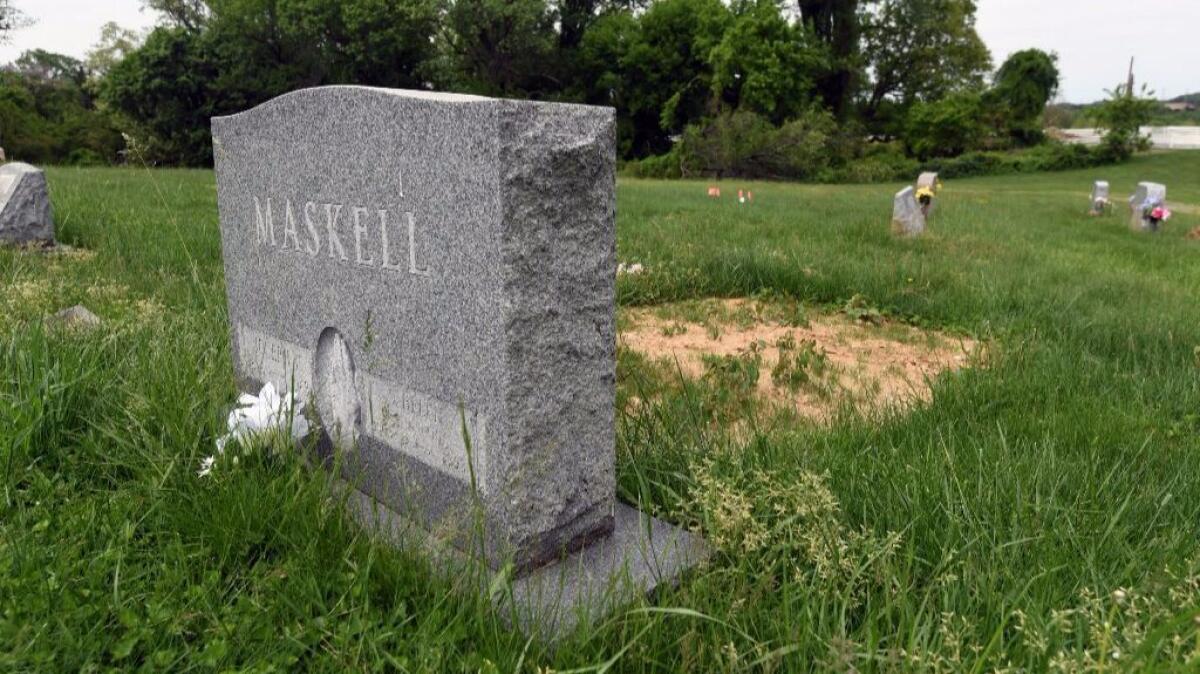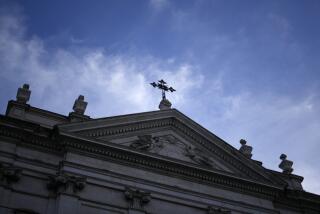Body of Maryland priest exhumed in investigation of nun’s slaying in 1970

- Share via
Reporting from BALTIMORE — Police in Maryland have exhumed the body of a Catholic priest who died in 2001 as part of the investigation into the unsolved slaying nearly 50 years ago of a Baltimore nun.
Baltimore County announced this week that they had opened the grave of of A. Joseph Maskell to compare his DNA with crime scene evidence in the cold case of Sister Catherine Ann Cesnik, whose body was found in Lansdowne, Md., in 1970.
Maskell’s body was exhumed Feb. 28 at Holy Family Cemetery in Randallstown and returned to its grave the same day, county police spokeswoman Elise Armacost said.
Cesnik’s case is the subject of the upcoming Netflix documentary “The Keepers,” a seven-part series premiering May 19. The documentary explores the theory that the 26-year-old Cesnik was killed because she knew of sexual abuse committed by Maskell.
Abuse allegations emerged in the 1990s against Maskell, who had worked as a chaplain and guidance counselor at Archbishop Keough High School in Baltimore. The Archdiocese of Baltimore has reached settlements with at least a dozen people who said Maskell abused them.
One of the women who came forward in the 1990s with allegations of abuse by the priest has implicated him in the nun’s death.
Maskell, who was removed from the ministry in 1994, denied allegations of abuse and also denied knowledge of Cesnik’s death.
Armacost said there was little physical evidence remaining in the decades-old case, but detectives “felt very strongly that in the interest of leaving no stone unturned, it was necessary to exhume Maskell’s body and compare his DNA to the evidence that is remaining.”
It will take up to six more weeks to get results from the DNA testing, Armacost said. She declined to specify what evidence remains from the crime scene.
There has long been speculation about whether Maskell might be connected to Cesnik’s death.
Attorney Joanne Suder, who has represented Maskell’s alleged victims, said at least one client told her they confided in Cesnik about abuse, and that the nun said she would tell “higher-ups.”
“I think if the various law enforcement agencies had done a proper job in the ‘70s, that could have avoided the necessity to do [an exhumation] in 2017,” Suder said.
Archdiocese of Baltimore spokesman Sean Caine said the exhumation “was total news to us.”
“We support it, especially if it helps lead them to a definitive conclusion about what happened,” Caine said.
“The archdiocese has been completely open and transparent with everything that we know,” he added.
After Maskell was removed from the ministry, he went to Ireland, Caine said. Church officials here learned of his whereabouts in the summer of 1996, when the archdiocese received an inquiry from an Irish bishop asking whether Maskell was in good standing.
Maskell was living in Wexford, Ireland. Archdiocese officials sent letters to Maskell instructing him not to perform any priestly duties and asking him to return to Baltimore, Caine said.
In 1998, the archdiocese learned that Maskell had returned to the United States and was living at Stella Maris, a Catholic nursing facility in Timonium, Md.
Since the 1990s, police have gathered the DNA of about six other people as part of the investigation into Cesnik’s death, Armacost said. They also have identified another suspect who is still living, she said. She did not offer details.
Cesnik taught at Archbishop Keough High School and then Western High School, and lived with another nun in southwest Baltimore. She went missing in November 1969 after going to a bank to cash a paycheck and then to a shopping center, where she bought buns at a bakery.
Her body was found in January 1970 in a field off. She had suffered blunt force trauma to her head.
Knezevich writes for the Baltimore Sun.
ALSO
Former top Justice Dept. official Sally Yates to testify about Michael Flynn and Russia
Puerto Rico to close 184 public schools amid economic crisis
Concerns over terrorism lead TSA to issue warning to trucking companies
More to Read
Sign up for Essential California
The most important California stories and recommendations in your inbox every morning.
You may occasionally receive promotional content from the Los Angeles Times.










